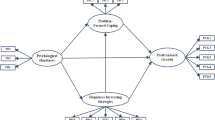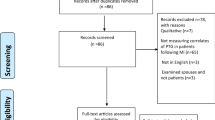Abstract
The concept of positive consequences arising as a result of coping with traumatic experiences, such as life-threatening illness, represents an emerging area of empirical study in the stress and health literature. This study investigates three specific psychosocial variables (personality, social support, and coping) in relation to posttraumatic growth in a population of individuals coping with heart disease. The results indicate that Extraversion was the most significant predictor of growth, and there is evidence that Problem-Focused Coping partially mediated this relationship between Extraversion and posttraumatic growth. The role of Social Support Satisfaction in predicting growth remains unclear. Findings emphasize the importance of personal and environmental factors in psychological interventions aimed at improving the adjustment and posttraumatic growth of heart patients. Directions for future research are proposed.
Similar content being viewed by others
REFERENCES
Affleck, G., & Tennen, H. (1996). Construing benefits from ad-versity: Adaptational significance and dispositional underpin-nings. Journal of Personality, 64(4), 899–922.
Affleck, G., Tennen, H., Croog, S., & Levine, S. (1987). Causal attri-butions, perceived benefits, and morbidity after a heart attack: An 8-year study. Journal of Consulting and Clinical Psychology, 55(1), 29–35.
American Heart Association. (2004). Heart disease and strokes statistics-2004 update. Dallas, TX: The American Heart Association.
American Psychiatric Association. (1994). Diagnostic and statistical manual of mental disorders (4th ed.). Washington, DC: Author.
Baron, R. M., & Kenny, D. A. (1986). The moderator-mediator variable distinction in social psychological research: Concep-tual, strategic, and statistical considerations. Journal of Personality and Social Psychology, 51(6), 1173–1182.
Bulman, R. J., & Wortman, C. B. (1977). Attributions of blame and coping in the "real world": Severe accident victims react to their lot. Journal of Personality and Social Psychology, 35(5), 351–363.
Burt, M. R., & Katz, B. L. (1987). Dimensions of recovery from rape: Focus on growth outcomes. Journal of Interpersonal Violence, 2(1), 57–81.
Calhoun, L. G., & Tedeschi, R. G. (1989-1990). Positive aspects of critical life problems: Recollections of grief. Omega, 20(4), 265–272.
Calhoun, L. G., & Tedeschi, R. G. (1998). Posttraumatic growth: Future directions. In I. B. Weiner (Ed.), Posttraumatic growth: Positive changes in the aftermath of crisis (pp. 215–238). Mahwah, NJ: Erlbaum.
Cohen, J. (1992). A power primer. Psychological Bulletin, 112(1), 155–159.
Cordova, M. J., Cunningham, L. L. C., Carlson, C. R., & Andrykowski, M. A. (2001). Posttraumatic growth following breast cancer: Acontrolled comparison study. Health Psychology, 20(3), 176–185.
Costa, P. T., Jr., & McCrae, R. R. (1985). The NEO Personality Inventory manual. Odessa, FL: Psychological Assessment Resources.
Costa, P. T., Jr., & McCrae, R. R. (1992). Revised NEO Personality Inventory (NEO PI-R) and NEO Five-Factor Inventory: Professional manual. Odessa, FL: Psychological Assessment Resources.
Fleeson, W., Malanos, A. B., & Achille, N. M. (2002). An intraindividual process approach to the relationship between extraversion and positive affect: Is acting extraverted as "good" as being extraverted? Journal ofs Personality and Social Psychology, 83(6), 1409–1422.
Folkman, S., & Lazarus, R. S. (1980). An analysis of coping in a middle-aged community sample. Journal of Health and Social Behavior, 21, 219–239.
Folkman, S., & Lazarus, R. S. (1985). If it changes it must be a process: Study of emotion and coping during three stages of a college examination. Journal of Personality and Social Psychology, 48(1), 150–170.
Goodman, L. A., Corcoran, C., Turner, K., Yuan, N., & Green, B. L. (1998). Assessing traumatic event exposure: General issues and preliminary findings for the Stressful Life Events Screening Questionnaire. Journal of Traumatic Stress, 11(3), 521–542.
Holmbeck, G. N. (1997). Toward terminological, conceptual, and statistical clarity in the study of mediators and moderators: Examples from the child-clinical and pediatric psychology literatures. Journal of Consulting and Clinical Psychology, 65(4), 599–610.
Janoff-Bulman, R. (1992). Shattered assumptions. New York: The Free Press.
Lane, D., Carroll, D., Ring, C., Beevers, D. G., & Lip, G. Y. H. (2002). The prevalence and persistence of depression and anx-iety following myocardial infarction. British Journal of Health Psychology, 7(1), 11–21.
O'Leary, V. E., & Ickovics, J. R. (1995). Resilience and thriving in response to challenge: An opportunity for a paradigm shift in women's health. Women's Health: Research on Gender, Behavior, and Policy, 1, 121–142.
Park, C. L., Cohen, L. H., & Murch, R. L. (1996). Assessment and prediction of stress-related growth. Journal of Personality, 64(1), 71–105.
Sarason, I. G., Levine, H. M., Basham, R. B., & Sarason, B. R. (1983). Assessing social support: The Social Support Questionnaire. Journal of Personality and Social Psychology, 44(1), 127–139.
Sarason, I. G., Sarason, B. R., Shearin, E. N., & Pierce, G. R. (1987). A brief measure of social support: Practical and theoretical implications. Journal of Social and Personal Relationships, 4, 497–510.
Schaefer, J. A., & Moos, R. H. (1992). Life crisis and personal growth. In B. N. Carpenter (Ed.), Personal coping: Theory, research, and application (pp. 149–170). Westport, CT: Praeger.
Schaefer, J. A., & Moos, R. H. (1998). The context for posttrau-matic growth: Life crises, individual and social resources, and coping. In R. G. Tedeschi, C. L. Park, & L. G. Calhoun (Eds.), Posttraumatic growth: Positive changes in the aftermath of crisis (pp. 99–125). Mahwah, NJ: Erlbaum.
Tedeschi, R. G., & Calhoun, L. G. (1996). The Posttraumatic Growth Inventory: Measuring the positive legacy of trauma. Journal of Traumatic Stress, 9(3), 455–472.
Tedeschi, R. G., Park, C. L., & Calhoun, L. G. (1998). Posttraumatic growth: Positive changes in the aftermath of crisis. Mahwah, NJ: Erlbaum.
Thompson, S. C. (1985). Finding positive meaning in a stressful event and coping. Basic and Applied Social Psychology, 6(4), 279–295.
Thornton, A. A. (2002). Perceiving benefits in the cancer experience. Journal of Clinical Psychology in Medical Settings, 9(2), 153–165.
Ziegelstein, R. C. (2001). Depression in patients recovering from a myocardial infarction. Journal of the American Medical Association, 286(13), 1621–1627.
Author information
Authors and Affiliations
Rights and permissions
About this article
Cite this article
Sheikh, A.I. Posttraumatic Growth in the Context of Heart Disease. Journal of Clinical Psychology in Medical Settings 11, 265–273 (2004). https://doi.org/10.1023/B:JOCS.0000045346.76242.73
Issue Date:
DOI: https://doi.org/10.1023/B:JOCS.0000045346.76242.73




